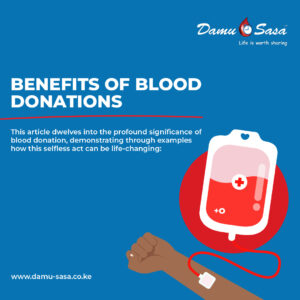Donating blood is a noble and necessary act that saves countless lives every year. However, it is crucial to protect both donors and recipients. As a result, there are precise guidelines for blood donation. Let’s examine these regulations to learn their significance and justification.
- Age and Weight Restrictions:
In Kenya, blood donors should be between the ages of 16 and 65, according to the Ministry of Health’s guidelines on blood donation. The lower age limit (16) is in part to ensure that only consenting adults proceed to donate blood. The upper age limit (65) is to safeguard against potential health hazards arising from blood donations among the elderly.
The minimum weight for any blood donor ought to be 50kg or 110 lbs. The weight requirement is meant to ensure that the blood donation exercise does not lead to a significant blood volume loss for the blood donor, as may be the case if the weight is less than 50kg.
- Frequency of donations:
The human body needs time to replenish decreased blood volume after every blood donation exercise. Accordingly, males ought to space their recurrent blood donation exercises by at least 3 months, while females space theirs by at least 4 months. That is because women are more prone to low haemoglobin levels and iron deficiency anaemia, as a result of menstruation.
- Medical Conditions:
On the day of donation, donors should be healthy and free of any illnesses. Several health conditions could prevent someone from donating. Below are some of them:
- Medication: Certain drugs may result in a temporary or permanent ban on donation. These include medications such as blood thinners or specific antibiotics. This is because blood thinners may have an impact on blood clotting, which could cause complications during donation. In addition, certain antibiotics may leave blood traces that may affect the recipient. It’s important to ensure that donated blood is of the highest quality and is safe for transfusion.
- Pregnancy: One cannot donate blood while pregnant. That is because a woman’s blood volume naturally increases during pregnancy, to support the developing fetus. Blood donation normally causes a brief decline in blood volume, which may affect support for the developing fetus. The waiting period post-delivery is 3 months after your baby is significantly weaned.
- Surgery: Depending on the surgical procedure undergone, a postponement period may be necessary before one can donate again. This is because the body requires time to recover and stabilize before donating blood. The precise surgery that was done determines how long the waiting time will last. This precaution mostly guarantees the safety of the blood donor and ultimately the recipient.
- Travel and Lifestyle:
Depending on the destination one has travelled to in the recent past, there might be a waiting period due to potential exposure to high-risk infectious diseases in those destinations. While one might look and feel healthy, a waiting time before donating may lessen the possibility of infections spreading to the recipient(s) through the donated blood.
Tattoos and Piercings also present various limitations to blood donation. For example, one has to wait for 3-4 months after getting the piercings and tattoos before they can donate blood. It also applies to microblading and semi-permanent makeup. That is to make sure that any possible risk of infection due to such beauty procedures has subsided.
- High-Risk Behavior:
Certain high-risk behaviours can increase the chance of contracting an infectious disease. These may consist of the following:
- Drug Use: Certain stimulants and drugs can disqualify someone from donating blood. That is especially true through the use of intravenous drugs, particularly when shared needles are used. That normally raises the risk of contracting various blood-borne diseases such as HIV, Hepatitis B, or even Hepatitis C. Usually, such diseases can spread to blood donation recipients through transfusion, hence the need for disqualification.
- Sexual Behaviors: Sexual behaviour can also influence one’s eligibility to donate blood. That is primarily because certain behaviours are associated with a higher risk of contracting blood-borne infections such as HIV and AIDS or any other STIs. Once again, such diseases can spread to blood donation recipients through transfusion. Such blood donors are normally put on probation for at least three months before subsequent testing to ascertain the absence of STIs.
We hope you will join our community by downloading our app either via the Google Play Store for Android, or the Apple App Store for IOS, to learn more about blood donation.
Edited By: Linda Roline
![]()







